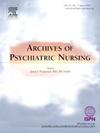躁郁症患者根据病情调整生活方式的生活经历
IF 2.2
4区 医学
Q1 NURSING
引用次数: 0
摘要
背景双相情感障碍患者自我管理策略的一个重要因素是根据病情调整生活方式,因为这样可以提高他们的生活质量。然而,并非所有躁郁症患者都能成功地适应生活方式。研究问题双相情感障碍患者在根据自身情况调整生活方式方面有哪些生活经验? 研究方法采用定性、描述性的现象学设计。研究人员对 16 名双相情感障碍患者进行了个人开放式访谈。根据 Colaizzi 的七阶段过程对数据进行了分析:(结论受访者表示,适应双相情感障碍的生活方式是一项艰巨的任务。适应工作受到一些因素的影响,例如躁郁症的波动性和不同程度的经验知识,并可能引起积极和消极的感受。生活方式的适应还与其他保持良好状态的策略相互关联,如接受诊断和与他人坦诚相待。建议医疗服务提供者应通过关注生活方式与其他躁郁症患者保持良好状态的策略之间的相互关系,来支持躁郁症患者适应自己的生活方式。本文章由计算机程序翻译,如有差异,请以英文原文为准。
The lived experience of patients with bipolar disorder with adapting their lifestyle to their condition
Background
An important element of self-management strategies for people with bipolar disorder is adapting their lifestyle to their condition, since this improves their quality of life. However, not all people with bipolar disorder succeed in lifestyle adaptation. Knowledge about their lived experience with adaptation would enhance understanding about how healthcare providers optimize support.
Research question
What is the lived experience of people with bipolar disorder with adapting their lifestyle to their condition?
Method
A qualitative, descriptive phenomenological design was used. Individual, open interviews were conducted with 16 people with bipolar disorder. The data were analyzed according to the seven-stage process by Colaizzi.
Findings
Three main themes were identified: (1) struggling to adapt lifestyle; (2) mixed feelings about lifestyle adaptation; and (3) supporting lifestyle adaptation.
Conclusion
Participants reported that adapting their lifestyle to bipolar disorder is a struggle. Adaptation is influenced by factors such as the fluctuating nature of the disorder and differing levels of experiential knowledge and can evoke both positive and negative feelings. Lifestyle adaptation is also interrelated with other strategies for staying well, such as accepting the diagnosis and being open with others. It can be enhanced by support from other people and by making use of practical tools.
Recommendations
Healthcare providers should support people adapting their lifestyle to bipolar disorder by being attentive to the interrelatedness of lifestyle aspects and other strategies for staying well with bipolar disorder.
求助全文
通过发布文献求助,成功后即可免费获取论文全文。
去求助
来源期刊
CiteScore
3.70
自引率
0.00%
发文量
131
审稿时长
160 days
期刊介绍:
Archives of Psychiatric Nursing disseminates original, peer-reviewed research that is of interest to psychiatric and mental health care nurses. The field is considered in its broadest perspective, including theory, practice and research applications related to all ages, special populations, settings, and interdisciplinary collaborations in both the public and private sectors. Through critical study, expositions, and review of practice, Archives of Psychiatric Nursing is a medium for clinical scholarship to provide theoretical linkages among diverse areas of practice.

 求助内容:
求助内容: 应助结果提醒方式:
应助结果提醒方式:


